
“I was attracted by his (Jinnah’s) personality, which has resulted in a book. If I was not drawn to his personality, I would not have written the book… He [not only] fought the British for an independent India but also fought resolutely and relentlessly for the interest of the Muslims of India”. On a question to whether Jinnah was a great man, he said, “Oh yes, self made man who resolutely worked towards achieving what he had set for himself.” While referring to the plight of the Indian Muslims today, he said, “Look into the eyes of the Muslims that live in India and if you truly see through the pain in which they live in to [the] land which they belong; we treat them as aliens”. Jaswant Singh (author of the book: Jinnah: India – Partition – Independence )
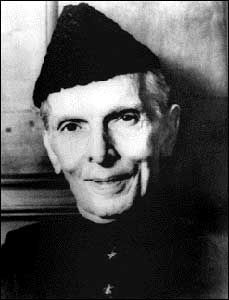
“I have lived as plain Mr. Jinnah and I hope to die as plain Mr. Jinnah. I am very much averse to any title or honours and I will be more than happy if there was no prefix to my name."
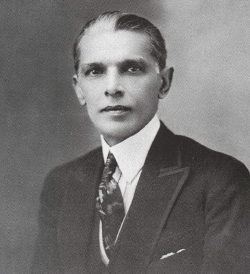 Nations are not born without the efforts of a few great men, who steer the people seeking freedom to their ultimate destiny through relentless efforts, far sightedness, vision and selflessness. The Indian subcontinent has seen may rulers, dynasties,
religions and civilizations ruling it from time to time. But the conquest of Sind by the Muslims in 711 AD by the Arabs, however, has had a far greater impact on the history and the future of the sub-continent than ever before. The conversion of local mainly Hindu population to
Islam and over 10 centuries long rule by Muslim rulers in one form or the other sparked a desire in the hearts of the Muslims of the subcontinent in the early 20th century for a separate homeland where they could live by their
religious aspirations without being intimidated by the Hindus of the area. This was no easy task - flinching freedom from the British and their Hindu allies. To this, rose a man to the
occasion who stood to the ground and fought the two to finally get a country for the Muslims of British India. This man was no less that Muhammad Ali Jinnah, revered as "Quaid e Azam" (the leader of the people) - he was a great constitutionalist, a distinguished parliamentarian, a seasoned politician, an indefatigable freedom-fighter, a dynamic Muslim leader, a political strategist and, above all one of the great nation-builder of modern times. From the very look of him, he was a thin, lean and fragile, but from within, he was a man of guts, courage, conviction and resolve.
Nations are not born without the efforts of a few great men, who steer the people seeking freedom to their ultimate destiny through relentless efforts, far sightedness, vision and selflessness. The Indian subcontinent has seen may rulers, dynasties,
religions and civilizations ruling it from time to time. But the conquest of Sind by the Muslims in 711 AD by the Arabs, however, has had a far greater impact on the history and the future of the sub-continent than ever before. The conversion of local mainly Hindu population to
Islam and over 10 centuries long rule by Muslim rulers in one form or the other sparked a desire in the hearts of the Muslims of the subcontinent in the early 20th century for a separate homeland where they could live by their
religious aspirations without being intimidated by the Hindus of the area. This was no easy task - flinching freedom from the British and their Hindu allies. To this, rose a man to the
occasion who stood to the ground and fought the two to finally get a country for the Muslims of British India. This man was no less that Muhammad Ali Jinnah, revered as "Quaid e Azam" (the leader of the people) - he was a great constitutionalist, a distinguished parliamentarian, a seasoned politician, an indefatigable freedom-fighter, a dynamic Muslim leader, a political strategist and, above all one of the great nation-builder of modern times. From the very look of him, he was a thin, lean and fragile, but from within, he was a man of guts, courage, conviction and resolve.
All through his parliamentary career, which spanned some four decades, he was probably the most powerful voice in the cause of Indian freedom and Indian rights. From Indian National Congress to Muslim League, Jinnah advocated the cause of freedom - from India to Pakistan. Once on the platform of the Muslim League Muhammad Ali Jinnah provided political leadership to the Indian Muslims and gave them expression and direction to attain their
legitimate aspirations. Through his articulate expression and in-depth knowledge of the sufferings of the Muslims at the hands of the British and the Hindus, he succeeded in convincing them about the legitimacy of the Muslims' demands. This is his story.
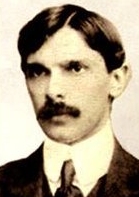 Early Life and Education
Muhammad Ali Jinnah was born on December 25, 1876 to Mr Jinnah Ali Poonja, a prominent businessman in Karachi. He had his early schooling at the famous Sindh Madrassat-ul-Islam and the Christian Mission School. Jinnah lost his father in 1901 when he was 25 years and thereafter looked after the family affairs as well as becoming lifetime guardian of his sister, Fatima. For his higher education and professional
pursuits, Jinnah chose Law and got admission in the Lincoln's Inn
in 1893 and become the youngest Indian to be called to the Bar at Law.
Through sheer hard work and determination, Jinnah rose to prominence and
became Bombay's most successful lawyer.
Early Life and Education
Muhammad Ali Jinnah was born on December 25, 1876 to Mr Jinnah Ali Poonja, a prominent businessman in Karachi. He had his early schooling at the famous Sindh Madrassat-ul-Islam and the Christian Mission School. Jinnah lost his father in 1901 when he was 25 years and thereafter looked after the family affairs as well as becoming lifetime guardian of his sister, Fatima. For his higher education and professional
pursuits, Jinnah chose Law and got admission in the Lincoln's Inn
in 1893 and become the youngest Indian to be called to the Bar at Law.
Through sheer hard work and determination, Jinnah rose to prominence and
became Bombay's most successful lawyer.
Jinnah and Politics
Having obtained prominence in his profession, Jinnah entered politics in 1905 from the platform of the Indian National Congress. It was the same time that Muslim League was also founded by Sir Agha Khan in 1906, but Jinnah was to
join the League much later. He went to England in that year along
with Gopal Krishna Gokhale (1866-1915), as a member of a Congress delegation to plead the cause of Indian self-government during the British elections. In January 1910, he was elected to the newly-constituted Imperial Legislative Council. Mr. Montagu (1879-1924), Secretary of State for India, considered Jinnah "perfect mannered, impressive-looking, armed to the teeth with
dialectics..."Jinnah, he felt, "is a very clever man, and it is, of course, an outrage that such a man should have no chance of running the affairs of his own country."
Jinnah had always advocated the cause of Hindu Muslim unity and while still
member of the Congress, he joined All India Muslim League in 1913 to become a bridge between the two major communities of India. This bridge resulted into the signing of famous Congress - Muslim League Pact of 1916, known popularly as Lucknow Pact - the only pact ever signed between the two political parties. The Lucknow Pact conceded Muslims the right to separate electorate, reservation of seats in the legislatures and
weight-age in representation both at the Centre and the minority provinces. It also meant that henceforth All-India Muslim League will be the representative
platform for the Muslims. And to Jinnah goes the credit for all this and Jinnah came to be
recognized among both Hindus and Muslims as one of India's most outstanding political leaders.
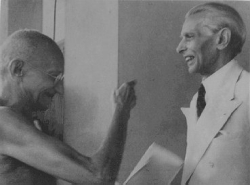 However, while being proponent of Hindu-Muslim unity, Jinnah rejected the injection of violence into politics and Gandhi's Satyagrah (civil disobedience) which meant boycott of government-aided schools and colleges, courts and councils and British textiles. Jinnah felt that Gandhi's doctrine of non-cooperation will lead to despair and resentment. He felt that there was no short-cut to independence and that Gandhi's extra-constitutional methods could only lead to lawlessness and chaos, without bringing India nearer to the threshold of freedom. Therefore Jinnah left the Congress in 1919 to devote himself fully to the cause of the Muslims and the Muslim League.
However, while being proponent of Hindu-Muslim unity, Jinnah rejected the injection of violence into politics and Gandhi's Satyagrah (civil disobedience) which meant boycott of government-aided schools and colleges, courts and councils and British textiles. Jinnah felt that Gandhi's doctrine of non-cooperation will lead to despair and resentment. He felt that there was no short-cut to independence and that Gandhi's extra-constitutional methods could only lead to lawlessness and chaos, without bringing India nearer to the threshold of freedom. Therefore Jinnah left the Congress in 1919 to devote himself fully to the cause of the Muslims and the Muslim League.
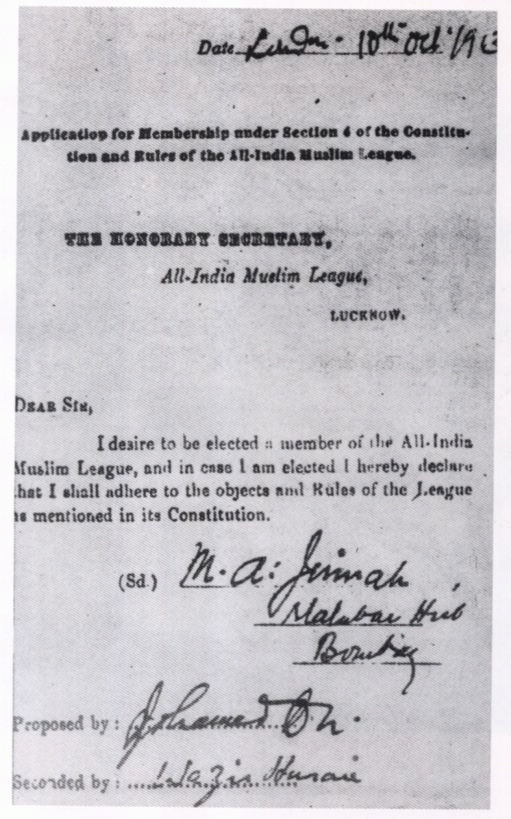
Jinnah and Muslim League In the 20s, deep distrust between the two communities started to brew and Indian National Congress refused to accept the genuine demands of the Muslims, when the somersaulted in the 1928 Nehru Report, which refused to accept the Muslim right to separate electorate, recognized earlier in the Lucknow Pact. The Nehru's Report's blank refusal to accept Muslim demands meant "the parting of the ways". Jinnah's disillusionment at the course of politics in the subcontinent prompted him to settle down in London in the early thirties. In 1934, Dr Allama Muhammad Iqbal persuaded him to come back assume the leadership of the Muslims. At that time, however, the Muslim League was ill-organized with no deep rooted representation, nor did the central body had any coherent policy of its own till the Bombay session (1936), which Jinnah organized. Jinnah devoted himself with singleness of purpose to organizing the Muslims on one platform and embarked upon country-wide tours. He pleaded with provincial Muslim leaders to sink their differences and make common cause with the League.
The first presence of Muslim was felt when it won a modest 108 (about 23 per cent) seats out of a total of 485 Muslim seats in the various legislatures in 1935. Though not very impressive victory, the League won the largest number of Muslim seats and surfaced as the only all-India party of the Muslims in the country. Thus, the elections represented the first milestone on the long road to putting Muslim India on the map of the subcontinent. However, the Congress, the dominant party in Indian politics, came to power in seven provinces exclusively, spurning the League's offer of cooperation. In that year, the Muslim League, under Jinnah's dynamic leadership, was reorganized and transformed into a mass organization, and made the spokesman of Indian Muslims as never before. The Congress provincial governments then embarked upon a policy in which Muslims felt that their religion, language and culture were not safe. This blatantly aggressive Congress policy was seized upon by Jinnah to awaken the Muslims to a new consciousness, organize them on all-India platform, and make them a power to be reckoned with. From now, the words of Jinnah became the voice of every Muslim of the subcontinent, "We are a nation - with our own distinctive culture and civilization, language and literature, art and architecture, names and nomenclature, sense of values and proportion, legal laws and moral code, customs and calendar, history and tradition, aptitudes and ambitions; in short, we have our own distinctive outlook on life and of life. By all canons of international law, we are a nation".
Demand for Pakistan The 1930 session of Muslim League, in which Dr Allama Muhammad Iqbal presented the idea of a separate homeland for the Muslims of India laid the foundation of Pakistan. In 1934, a Cambridge student Rehmat Ali coined the word "Pakistan". This idea was finally refined and presented in the 23 March 1940 Lahore session of the Muslim League. From now on all out efforts were to be made to attain Pakistan at all costs. The demand, however, was totally rejected by Gandhi since it shattered his pseudo-Indian approach. Not only the Hindu reaction was quick and bitter, malicious, the British also became hostile to the Muslim demand. However, Jinnah was undeterred and it was his powerful advocacy of the case of Pakistan and his remarkable strategy in the delicate negotiations, that followed the formulation of the Pakistan demand, particularly in the post-war period, that made the demand for Pakistan inevitable.
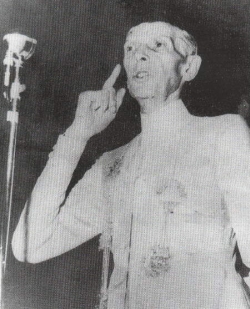
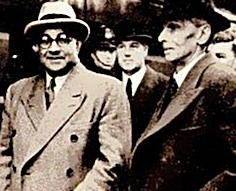
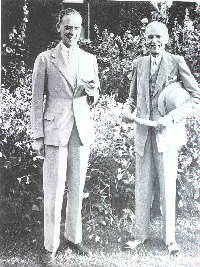
Realizing the dissatisfaction growing among the Muslims, the British initiated a number of steps to appease the growing demand for a separate Muslim
homeland. Cripps Mission in April, 1942 was first such effort, which conceded the principle of self-determination to provinces on a territorial basis, but was rejected by Jinnah since it did not talk of separate homeland for the Muslims. In 1944, Gandhi tried to persuade Jinnah to abandon his demand and presented the Congress alternative to Pakistan. But Jinnah again turned it down since it still meant Muslims serving as a minority under the dominant Hindus. Cabinet Mission in 1946 was finally came to the conclusion that the central issue in Indian politics was Pakistan.
Cabinet Mission Plan
stipulated a limited centre, with foreign affairs, defence and communications
and three autonomous groups of provinces - two groups of Muslim majority in the
north-west and the north-east of the subcontinent, while the third one,
comprising the Indian mainland, to have a Hindu majority. Jinnah interpreted the
clauses as cue for the foundation of Pakistan and induced the Muslim League
Council to accept the Plan in June 1946; much to the dismay of the Congress.
This resulted into Hindus rising against the Muslims which led to a wave of
communal riots all over he subcontinent. The two peoples, it seemed, were
engaged in a fight to the finish. Realizing the gravity of the situation, the
British government sent a new Viceroy, Lord Mountbatten. His protracted
negotiations with the various political leaders resulted in his 3 June 1947
Partition Plan by which the British agreed to partition of the subcontinent, and
hand over power to two successor States on 15 August, 1947. This was the triumph
of the unified effort of all Muslims of the India, led by Muhammad Ali Jinnah,
whom Muslims rightly started to address as the Quaid-e-Azam (the great leader).
A rare video of Jinnah by BBC
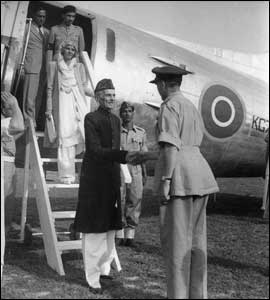 Jinnah's Pakistan:
Thus on night 14-15 August 1947, Pakistan was carved out of the British India as an independent
sovereign country to serve the aspirations of 700 million Muslims that opted to be part of it. As was expected, the Hindus did every thing to deny the very
existence to this newly born state and choked its share of cash balance. Soon, India militarily annexed Junagadh and Hyderabad Daccen (which had originally acceded to Pakistan) and later Kashmir. On top of all this, some eight million refugees poured into Pakistan
which needed to be sheltered and fed. Under such precarious circumstances
with empty kitty, it was nothing short of a miracle that Pakistan survived, mainly due to Allah's help and dynamic leadership of none other than Mohammad Ali Jinnah. Jinnah laid down the policies of the new state,
directed the members of the Constituent Assembly, the civil servants and the Armed Forces what to do and ensured that law and order was maintained at all costs, despite the provocation that the large-scale riots in north India had provided. He moved from Karachi to Lahore to personally supervise the rehabilitation of the countless refugee. Despite his poor health, he remained calm and composed, while directing people and officials to concentrate on helping the refugees, to
avoid retaliation, exercise restraint and protect the minorities.
Jinnah's Pakistan:
Thus on night 14-15 August 1947, Pakistan was carved out of the British India as an independent
sovereign country to serve the aspirations of 700 million Muslims that opted to be part of it. As was expected, the Hindus did every thing to deny the very
existence to this newly born state and choked its share of cash balance. Soon, India militarily annexed Junagadh and Hyderabad Daccen (which had originally acceded to Pakistan) and later Kashmir. On top of all this, some eight million refugees poured into Pakistan
which needed to be sheltered and fed. Under such precarious circumstances
with empty kitty, it was nothing short of a miracle that Pakistan survived, mainly due to Allah's help and dynamic leadership of none other than Mohammad Ali Jinnah. Jinnah laid down the policies of the new state,
directed the members of the Constituent Assembly, the civil servants and the Armed Forces what to do and ensured that law and order was maintained at all costs, despite the provocation that the large-scale riots in north India had provided. He moved from Karachi to Lahore to personally supervise the rehabilitation of the countless refugee. Despite his poor health, he remained calm and composed, while directing people and officials to concentrate on helping the refugees, to
avoid retaliation, exercise restraint and protect the minorities.
He assured the minorities of a fair deal, assuaged their inured sentiments, and gave them hope and comfort. He toured the various provinces, attended to their particular problems and instilled in the people a sense of belonging. He secured the accession of number of independent States, and
entered into negotiations with Lord Mountbatten for the settlement of the Kashmir Issue. However, the life did not
side with him much longer and finally he left the mourning nation for his heavenly abode on 11 September 1948.
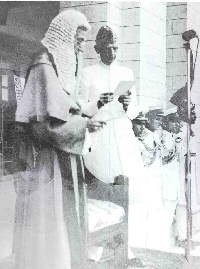
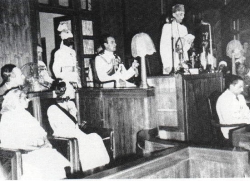
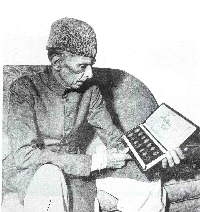
(Left to Right) - Oath as first Governor General of Pakistan - Addresses to firsts session of Constituent Assembly -First coins issued by State Bank of Pakistan
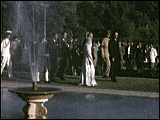
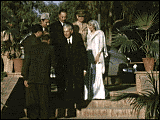
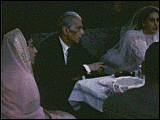
Rare Coloured Photographs of Jinnah's visit to Lahore in 1948 and Reception by Citizens of Lahore in Shalamar Gardens
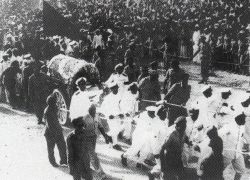
The Last Voyage - Jinnah left the one year old nation mourning on 11 September 1948
|
|
|
"Mr. Jinnah was great as a lawyer, once great as a Congressman, great as a leader of Muslims, great as a world politician and diplomat, and greatest of all as a man of action, By Mr. Jinnah's passing away, the world has lost one of the
greatest statesmen and Pakistan its life-giver, philosopher and guide".
--------------------------------------------------------- Surat Chandra Bose, leader of the Forward Bloc wing of the Indian National Congress |
|
Jaswant Singh writes in his book " Jinnah: India
– Partition – Independence“…He (Jinnah) created something out of nothing and
single-handedly stood against the might of the Congress and the British who
didn’t really like him...Gandhi himself called Jinnah a great Indian. Why
don’t we recognise that? Why don’t we see (and try to understand) why he
called him that?...I admire certain aspects of his personality; his
determination and the will to rise. He was a self-made man. Mahatma Gandhi
was the son of a Diwan. All these (people) – Nehru and others – were born to
wealth and position. Jinnah created for himself a position. He carved in
Bombay a position for himself. He was so poor that he had to walk to work…He
told one of his biographers that there was always room at the top but no
lift…and he never sought a lift”. Jaswant Singh goes on to say that the
Indian leaders had not only misunderstood Jinnah but made a demon out of
him. According to him the demonisation of Jinnah was a direct result of the
trauma of partition. Singh also said that the view held by many in India
that Jinnah hated Hindus was a mistake. |
|
Related Links:
| Father of the Nation
| Muhammad
Ali Jinnah |
Jinnah: Pakistan's founding Father |
Wikipedia |
|
|
| HOME PAGE | MORE CELEBRITIES | Copyright©JalalsPages - 2005 - 2009 |